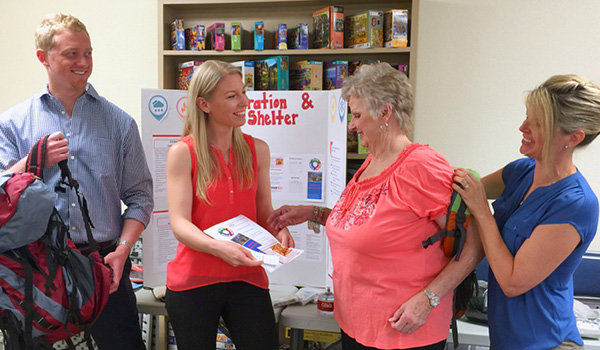
Community connections Partnerships provide real-world problem solving
The wildfires that transfixed Northern California in September 2015 left a trail of destruction and lingering fears of vulnerability for those living near the burn zone. A team of graduate nursing students used their experience in emergency care to improve disaster preparedness for rural seniors traumatized by the event.
Partnering with community mentors, master’s-degree nursing students Wendin Gulbransen, John Eichenberger and Anna Olszewski developed an emergency preparedness workshop to engage seniors with hands-on demonstrations and interactive displays. The goal: to engage with the community, identify a pressing need and deliver a useful solution.
“First, we conducted a community needs and strengths assessment by attending several agency meetings throughout the county,” explains Eichenberger, a home health nurse in South Lake Tahoe. “There, we gained a better sense of where emergency preparedness was deficient.”
“I have been working on emergency preparedness for 10 years now, so to combine my personal passion with the need in this community was perfect,” adds Gulbransen, an emergency department nurse at Kaiser Permanente in Sacramento.
The students developed a workshop focused on three main areas: records and communication, preparation and shelter, and transportation and evacuation. From providing templates for tracking pertinent vital signs to displaying items to include in a personal “go bag,” the students offered ways to engage that best suited the seniors’ adult-learning styles.
“The fire really raised questions about personal preparedness and the students really latched onto that,” says Laurie Webb, executive director of the Amador Senior Center. “They created a wonderful project that we’ll continue using.”
“During the fire, you could tell people really wanted to do something, whether it was taking care of their neighbors or helping out in general,” adds Nina Machado, executive director of First 5 Amador. “Having the nurses in this project come up with something that people could learn about assisting their neighbors or being more prepared, it was great timing.”
Webb and Machado have served as site mentors for the School of Nursing’s Community Connections course for four years. Faculty developed the course for first-year, master’s-degree leadership students to move them from their clinical settings into a community to research, identify and implement a systemwide solution.
“All of our master’s-leadership students are registered nurses and most come from hospital settings,” explains Ester Carolina Apesoa-Varano, a Community Connections instructor. “Going out into community settings, to deploy skills they already have as experienced practitioners, enables them to develop new skills around leadership, collaboration and teamwork.”
“My lens is very narrow in acute care inside a hospital, but this experience has brought a new perspective about what matters to people before a disaster strikes,” adds Olszewski, a burn center nurse at UC Davis Medical Center.
“I come into these experiences looking for what I can learn so I can give back in a meaningful way,” Gulbransen says. “I’ll definitely look at my job differently now.”

